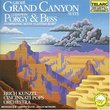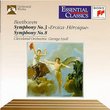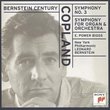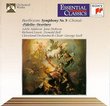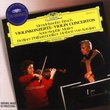| All Artists: Luigi Cherubini, Antonin Dvorak, Franz Joseph Haydn, Wolfgang Amadeus Mozart, Robert Schumann, Arturo Toscanini, NBC Symphony Orchestra Title: Arturo Toscanini: Great Symphonies, Vol. 6 Members Wishing: 0 Total Copies: 0 Label: RCA Release Date: 8/10/1999 Album Type: Original recording remastered Genre: Classical Styles: Historical Periods, Classical (c.1770-1830), Symphonies Number of Discs: 2 SwapaCD Credits: 2 UPC: 743215948124 |
Search - Luigi Cherubini, Antonin Dvorak, Franz Joseph Haydn :: Arturo Toscanini: Great Symphonies, Vol. 6
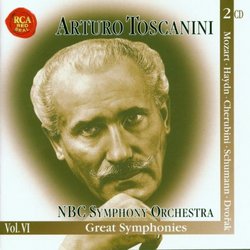 | Luigi Cherubini, Antonin Dvorak, Franz Joseph Haydn Arturo Toscanini: Great Symphonies, Vol. 6 Genre: Classical
|
Larger Image |
CD DetailsSimilar CDs
Similarly Requested CDs
|
CD ReviewsWhy did it take so long? madamemusico | Cincinnati, Ohio USA | 08/14/2000 (4 out of 5 stars) "I have been collecting and/or listening to Arturo Toscanini's recordings since 1967, and they have NEVER sounded this good. Indeed, I challenge you to play this pressing of the Haydn #94 for someone and ask them to guess when it was recorded. The sound is so good that they will probably guess the early '60s.But here the quandary: Why did it take RCA Victor nearly a half-century to "decompress" Toscanini's recordings and make them sound almost lifelike? I mean, look at it this way: with the advent of modern tape recorders, digital technology, etc., they should have been able to make them sound this good during their first reissues of the early 1990s. Granted, all of those CDs at least sounded full and solid rather than thin and shrill, but you were still presented with what I call a "two-dimensional orchestra," one in which allthesectionswerecongestedtogetherlikethis. The result was a muddy wall of sound that still didn't sound entirely real.As for the performances: this Mozart 40th is epic, with a tragic grandeur missing from most performances. The Haydn 94th may not be Urtext, but it is beautifully played and fun to listen to. The Cherubini is a lightweight piece, yet still better than Schumann's 4th Symphony or Brahms' 3rd. The Schumann 3rd is absolutely thrilling, and the Dvorak 9th is still (to me) the best performance of this symphony ever recorded. Here, Toscanini minimized the "folksy" quality of the music in favor of a leaner, more Tchaikovskian reading, and the result is deeply moving as well as having great forward momentum.You may be wondering whether or not this 2-CD set is worth getting. Wonder no longer. This is a fabulous tribute to what the Maestro was able to accomplish with a second-rate orchestra, as are the new sets of Wagner (Vol. 7), French orchestral music (Vol. 9), Italian orchestral music, and especially the "Choral Works" album with his mind-boggling performance of the Verdi Requiem. I only gave this set 4 stars, however, because RCA still can't make the Studio 8-H recordings (the Mozart and Schumann) sound ENTIRELY good...but we have definitely moved closer to reality." Classical and Romantic symphonies Robert E. Nylund | Ft. Wayne, Indiana United States | 01/23/2006 (5 out of 5 stars) "There's no question that the bulk of Arturo Toscanini's repertoire came from the Classical and Romantic eras. Here is a compilation of several outstanding symphonies that Toscanini conducted during his long career, taken from remarkable RCA Victor recordings of the NBC Symphony Orchestra. The haunting, sometimes tragic side of Mozart's elusive 40th symphony did not escape Toscanini. It was easy to dismiss much of Mozart's work as "lightweight" or even frivolous, in the light of the major steps taken by composers in the nineteenth century. Perhaps music-lovers were spoiled by the greater drama, power, and innovation of Beethoven. Yet Toscanini recognized that there ARE numerous times in Mozart's music where this brilliant genius wrote profoundly dramatic and serious tunes. The 40th symphony, in particular, is filled with hints that the composer recognized that not everything was wonderful; anyone who has seen the movie "Amadeus" or read the true accounts of the composer's life will recognize that life was a great struggle for Mozart, despite his fame and successes and it wasn't just because Mozart couldn't manage his money. Nevertheless, this performance of the familiar Mozart symphony, one of the last three he composed (during the summer of 1788), is absolutely inspired and exciting. Toscanini recognized the true genius in Mozart and saw that Haydn was more human and possibly more approachable. Haydn was also closer to Beethoven, certainly through their teacher-student relationship and Beethoven's own continued devotion to Haydn, as demonstrated at the performance of the oratorio "The Creation," near the end of Haydn's life, when Beethoven bowed and kissed Haydn's hand! The so-called "surprise" symphony, one of 12 written for performances in London in the 1790's, is given its full due in this performance. This is Haydn at his best and Toscanini's interpretation is among the best, even if some may complain it is not up to the standards of today's "original instruments" performances. Luigi Cherubini's "Symphony in D" is rarely performed or recorded anymore. It's really unfortunate that such an enjoyable work is neglected. Certainly Toscanini's recording brings out the best in this dramatic work that so points toward the development of Romanticism. It is much in the spirit of Schubert and Beethoven, one of the rare Italian symphonies that really makes one wish Cherubini or one of the other Italian composers better known for operas had written more purely orchestral works. One can also enjoy Toscanini's performances of the overtures to some of the Cherubini operas, particularly "Medea"; these are also quite good and available elsewhere. Robert Schumann's third symphony, called "The Rhenish," is a curious five-movement work that is given a thoroughly enjoyable performance by the NBC Symphony in this recording, taken from a 1949 broadcast concert in Studio 8-H. This writer first heard the recording in one of the imported European pressings on vinyl and was amazed at the powerful playing, beginning with the first movement with its remarkably precise and exciting playing. There's even Toscanini's familiar humming as he became so involved in performance! The deeply moving section depicting the cathedral in Cologne is filled with awe and deep feeling. This sets the stage for the triumphant finale. Once again, the overall performance sets the standard for performances of this symphony. Finally, there is the amazing 1953 recording of Dvorak's ninth symphony, which was, of course, considered his fifth for many years, until his earlier, first four symphonies were finally published, performed, and recorded. This Carnegie Hall performance is about as powerful as any recorded. One marvels at the fact that Toscanini turned 86 years old the year this recording was made. All of the beloved melodies, wholly original (Dvorak insisted) but inspired by Negro spirituals and Indian chants, are played with great feeling. This is clearly a performance to treasure. The overall collection is a good representation of the variety of symphonies, other than the Beethvoen and Brahms, that were part of Toscanini's standard repertoire. " A fair portrait of the Maestro in familiar territory Santa Fe Listener | Santa Fe, NM USA | 12/07/2005 (4 out of 5 stars) "In the 78rpm era Toscanini set the standard for almost every classical composer he conducted, each put through his trademark precision drill. Especially in America, where Toscanini devoted decades to the Met, the NY Phil, and the NBC Sym., only Stokowski had a fraction of his public renown and none of the reverence accorded Toscanini. Here we get him in a range of standard works: the Mozart 40th, Haydn "Surprise" Sym. 94, Schumann "Rhenish," Dvorak "New World," and the now nearly forgotten Cherubini Sym. in D, a personal favorite of his. The new remastering is the best yet, and even though none of these historic mono recordings gives a true feeling for the mesmerizing spell he cast, their excitement and intensity are unmistakable.
Yet for me, none of these perfformances sounds very different from the others. Toscanini always avoided excessive underlining in romantic works and precious refinement in classical ones. He kept strict time, though with a breath of relaxation so as not to sound like a martinet. To a generation thrilled by precision and dash, these were benchmark performances. I don't think they've worn particularly well, though. The Mozart and Haydn contain more charm than I remembered, however, and the newly remastered sound suggests some orchestral color. But if you didn't know that this was Toscanini, how much special character, much less uniqueness, can really be detected? Four stars for great memories of a historic maestro." |

 Track Listings (12) - Disc #1
Track Listings (12) - Disc #1


![Wagner: Lohengrin [Highlights]](/images/no_cover/m.png?v=5b450bfd)




